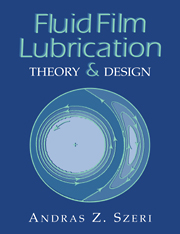Book contents
- Frontmatter
- Contents
- Preface
- 1 Introduction
- 2 Basic Equations
- 3 Thick-Film Lubrication
- 4 Dynamic Properties of Lubricant Films
- 5 Effects of Fluid Inertia
- 6 Flow Stability and Transition
- 7 Turbulence
- 8 Elastohydrodynamic Lubrication
- 9 Thermal Effects
- 10 Lubrication with Non-Newtonian Fluids
- 11 Gas Lubrication
- Index
9 - Thermal Effects
Published online by Cambridge University Press: 12 January 2010
- Frontmatter
- Contents
- Preface
- 1 Introduction
- 2 Basic Equations
- 3 Thick-Film Lubrication
- 4 Dynamic Properties of Lubricant Films
- 5 Effects of Fluid Inertia
- 6 Flow Stability and Transition
- 7 Turbulence
- 8 Elastohydrodynamic Lubrication
- 9 Thermal Effects
- 10 Lubrication with Non-Newtonian Fluids
- 11 Gas Lubrication
- Index
Summary
Classical lubrication theory predicts bearing performance on the assumption that the viscosity of the lubricant is uniform and constant over the whole film. As the bearing performance is strongly dependent on lubricant viscosity, and as the viscosity of common lubricants is a strong function of temperature (see Figure 9.1), the results of classical theory can be expected to apply only in cases where the lubricant temperature increase across the bearing pad is negligible.
Effective Viscosity
In many applications (small bearings and/or light running conditions) the temperature rise across the bearing pad, although not negligible, remains small. It is still possible in these cases to calculate bearing performance on the basis of classical theory, but in the calculations one must employ that specific value of the viscosity, called the effective viscosity, that is compatible with the average temperature rise in the bearing. This might be realized, for instance, by making an initial guess of the effective viscosity, followed by an iterative procedure, using Figure 9.1, for systematically refining the initial guess. Boswall (1928) calculated the effective viscosity on the basis of the following assumptions:
All the heat generated in the film by viscous action is carried out by the lubricant.
The lubricant that leaves the bearing by the sides has the uniform temperature Θ = Θi + ΔΘ/2, where ΔΘ = Θ0 – Θi is the temperature rise across the bearing.
Let Q and Qs represent the volumetric flow rate of the lubricant at the pad leading edge and at the two sides, respectively.
- Type
- Chapter
- Information
- Fluid Film LubricationTheory and Design, pp. 314 - 351Publisher: Cambridge University PressPrint publication year: 1998



